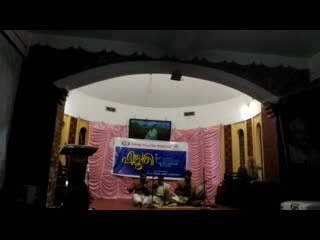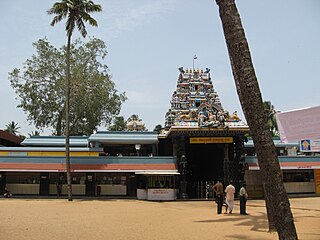
Dhol can refer to any one of a number of similar types of double-headed drum widely used, with regional variations, throughout the Indian subcontinent. Its range of distribution in Indian subcontinent primarily includes northern areas such as the Jammu, Himachal, Punjab, Haryana, Delhi, Kashmir, Sindh, Assam Valley, Uttarakhand, West Bengal, Odisha, Gujarat, Maharashtra, Konkan, Goa, Karnataka, Rajasthan, Bihar, Jharkhand and Uttar Pradesh. A related instrument is the dholak or dholki. Dhols are amongst other events used in Indian wedding ceremony processions such as Baraat or Varyatra.

Pooram pronounced [puːɾam] is an annual festival, which is celebrated in temples dedicated to goddesses Durga or Kali held especially in Valluvanadu area and other adjoining parts of north-central Kerala after the summer harvest. Harimattom pooram is the one of the famous pooram in Ernakulam. An example of a famous pooram is Thirumandhamkunnu Pooram which has an active participation of 11 Lakh people across the country. Most pooram festivals have at least one ornately decorated elephant being paraded in the procession taken out of the temple precincts. However, there are some well known poorams, such as Anthimahakalankavu Vela, Chelakkara, Aryankavu Pooram at shoranur Palakkad and Machad mamangam near Wadakkanchery that do not use the caparisoned elephant, instead go for stilted mannequins of horses or bullocks. Vela is also a festival like pooram. Thrissur Pooram is the most famous of all poorams, known for fire works. The second best known Pooram in Kerala is Uthralikavu Pooram. Kavassery pooram is well known for fireworks during afternoon. Some other well-known pooram festivals are Arattupuzha-Peruvanam Pooram, Chalissery Pooram, Anthimahakalankavu Vela, Nenmara Vallangi Vela, Chinakathoor pooram, Mannarkkad Pooram, Kavassery Pooram, Pariyanampatta Pooram, Harimattom Pooram and Thirumandhamkunnu Pooram. Peruvanam-Arattupuza pooram is celebrating its 1436th year in 2018.

The culture of Indonesia has been shaped by long interaction between original indigenous customs and multiple foreign influences. Indonesia is centrally-located along ancient trading routes between the Far East, South Asia and the Middle East, resulting in many cultural practices being strongly influenced by a multitude of religions, including Buddhism, Christianity, Confucianism, Hinduism, and Islam, all strong in the major trading cities. The result is a complex cultural mixture, often different from the original indigenous cultures.

Poorakkali is a traditional dance ritual performed by men during the nine-day Pooram festival in Bhagavathy temples across North Malabar in Kerala State of south India.

The culture of Kerala has developed over the past millennia, influences from other parts of India and abroad. It is defined by its antiquity and the organic continuity sustained by the Malayali people. Modern Kerala society took shape owing to migrations from different parts of India and abroad throughout Classical Antiquity.

Garudan Thookkamis a ritual art form performed in certain Kali temples in some Central Kerala districts in south India. The people who dress up as Garuda perform the dance. After the dance performance, the hang-designate dangle from a shaft hooking the skin on his back. In some places, the ritual is performed colorfully with Garudas taken in a procession on bullock carts or boats or hand pulled carts. It will be available in Devi temple during the festival of Meena bharani and Pathamudayam in Thiruvanchoor in Kottayam district.

The magnificent ancient Devi temple is situated in Urakam, a serene village, located approximately about 12 km from Thrissur city and almost the same distance from Irinjalakuda town when one travel towards Thrissur.

Pulluvan Pattu is a form of serpent worship performed by both the lower castes and higher castes, in addition to serpent temples. The pulluvar of Kerala are closely connected to serpents. They consider the snake gods their presiding deities and perform sacrifices and sing songs.

Karnataka has a variety of traditional arts, including folk dance and puppetry.
Tamil Nadu has a rich history of art and entertainment. The three modes of entertainment classified as Iyel (Literature), Isai (Music) and Nadagam (Drama) had their roots in the rural folk theatre like Theru Koothu. Many forms of group and individual dances with the classical forms for popularity and sheer entertainment value. Some of the dance forms are performed by Tribal people. The majority of these dances are still thriving in Tamil Nadu today.

The Attukal Bhagavathy Temple is a Hindu religious shrine at Attukal in Kerala, India. Goddess Bhadrakali (Kannaki), mounted over 'vethala', is the main deity in this temple. Bhadrakali, a form of Mahakali, who killed the demon king Daruka, believed to be born from the third eye of lord Shiva. 'Bhadra' means good and 'Kali' means goddess of time. So Bhadrakali is considered as the goddess of prosperity and salvation. Goddess 'Attukal devi', itself is the supreme mother 'Bhaadrkali devi', the goddess of power and courage. She is often referred as Kannaki, the heroine of Ilanko Adikal's 'Silapathikaaram'. The temple is renowned for the annual Attukal Pongal festival, in which over three million women participate. A festival that has figured in the Guinness Book of World Records for being the single largest gathering of women for a religious activity, the Attukal Pongala continues to draw millions of women with each passing year. According to the Attukal Temple Trust, around 4.9 million devotees are expected to attend the pongala in 2016. Attukal Temple is situated near the heart of the city, 2 kilometres away from Sree Padmanabhaswamy Temple, East Fort in Thiruvananthapuram. Devotees believe that all of their wishes will be fulfilled by the goddess, provide prosperity and can attain salvation. Attukal devi is often worshipped in 3 forms such as Maha Saraswati, Maha Lakshmi and Mahakali/ Parvathy.

Chettikulangara Sree Bhagavathi temple is one of the most renowned Hindu temples in Kerala. Main deity Sree Bhadrakali, The temple is located at Chettikulangara in Mavelikkara taluk of Alappuzha district in the Indian state of Kerala. The temple is situated about 4 kilometres (2.5 mi) west of Mavelikkara town, 7 kilometres (4.3 mi) north of Kayamkulam city on SH6. Bhadrakali, is an incarnation of supreme mother Shakthi devi, born from the third eye of Lord Shiva, to kill the demon king Daruka. 'Bhadra' means good and 'Kali' means goddess of time. So Bhadrakali is worshipped for prosperity and salvation. Devi is considered as the creator, protector, destructor, nature, power and Kundalini shakthi. Chettikulangara is located near Kayamkulam city.

Peruvanam Pooram is one of the most popular temple festivals of the South Indian state of Kerala. It is held at Peruvanam Temple in Cherpu, Thrissur District. Lord Shiva is the presiding deity of this temple.
Hinduism, Islam and Christianity are the prominent religions in Kollam district. As per the Census 2011, out of the total population of 2,635,375 persons, 64.42% follow Hinduism, 19.30% follow Islam and 16.00% follow Christianity. Other religions comprise 0.04%, while 0.25% did not state any religion.

Tholpavakoothu is a form of shadow puppetry that is practiced in Kerala, Tamil Nadu, India. It is performed using leather puppets and is performed in temples or in villages in specially built theatres. This form of art is especially popular in the Madurai and nearby districts of Madurai in TamilNadu and also in palakkadThrissur and Malappuram districts of Kerala.
Several folk dance forms evolved in different regions of Odisha, Odissi and Chhau being some popular forms. Sambalpuri dance is most popular dance of western Odisha and is enjoyed by many.

Karthyayani Devi Temple, Cherthala is a famous Hindu temple located at Cherthala. Iratti and Thadi are the famous vazhipadu, Cherthala pooram is the second famous pooram in Kerala. Kalabham, in familywise, can be held on there, kalabham is a famous vazhipadu.

Thirumandhamkunnu Pooram(Malayalam: തിരുമാന്ധാംകുന്ന് പൂരം) is an important temple festival of Central Malabar, Kerala, India. Thriumandhamkunnu Temple is said to be one among the three important Bhagavathi temples of Kerala, the others being Kodungallur and Panayannarkavu. Daily pooja attracts thousands of devotees. The famous Mangalya Pooja attracts thousands of young girls, who seeks fortune of a good wedlock.
The Higantes Festival is a local festival held annually In Angono, Rizal, Philippines, where hundreds of giant papier-mâché puppets are paraded, representing the common people's mockery of the bad hacienda (land) owners of the past during Spanish colonial rule. It has evolved into also celebrating the feast of Pope St. Clement I, every 22 and 23 November.















